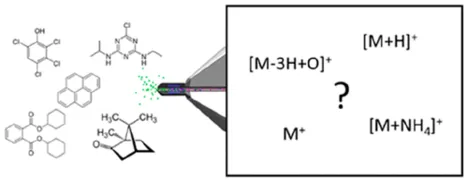New Publication in American Society for Mass Spectrometry

Markus Weber, Jan-Christoph Wolf and Christoph Haisch
ACS (2023)
Abstract
Cold plasma-based ionization techniques allow for soft ionization of a wide variety of chemical compounds. In this chemical ionization mechanism, the atmosphere plays a crucial role in ionization. Knowing its influence is critical for the optimization of analysis conditions and interpretation of resulting spectra. This study uses soft ionization by chemical reaction in transfer (SICRIT), a variant of dielectric barrier discharge ionization (DBDI), that allows for a controlled atmosphere to investigate atmosphere and dopant effects. The influence of eight makeup gas compositions (dry nitrogen, room air, and nitrogen-enriched with either water, HCl, MeOH, hexane, NH3, and fluorobenzene) on the ionization with SICRIT was investigated. Fifteen compound classes, comprising alkanes, polyaromatic hydrocarbons (PAHs), terpenes, oxygen-containing terpenes, alkylphenols, chlorophenols, nitrophenols, trialkylamines, triazines, phthalates with or without ether groups, aldehydes, ketones, fatty acid methyl esters (FAMEs), and polyoxy-methylene ethers (OMEs) were measured via gas chromatography SICRIT high-resolution mass spectrometry (GC-SICRIT-HRMS). The different atmospheres were compared in terms of generated ions, ion intensities and fragmentation during ionization. Measurements of reactant ions were performed for a better understanding of the underlying mechanisms. All 15 compound classes were mostly softly ionized. For most compound classes and atmospheres, protonation is the dominant ionization mode. The highest number of compounds ionized via protonation was observed in dry nitrogen, followed by room air and humid nitrogen. The study should work as a guideline for the choice of atmosphere for specific compound classes and the interpretation of spectra generated under a specific atmosphere.